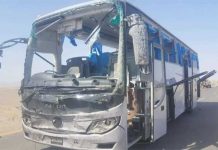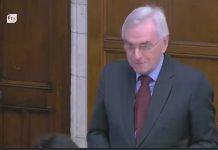Author: Hakeem Wadhela
According to Dashti, 2012 “the Khan of Baloch declared the Independence of Balochistan in a formal proclamation on August 12, 1947. Nawabzada Muhammad Aslam Khan was appointed as the first prime minister of the independent state.” Unfortunately, the days of freedom did not last very long for the people of Balochistan.
On 27th of March 1948, Balochistan was attacked and Qalat Mosque and Palace of the Khan was bombarded by the invading forces. This time the invaders were not British, Portuguese or other imperial powers who came from thousands of miles away to conquer and rule. This time Balochistan was hit by a state which was created seven months ago in the name of Islam and this state was supposed to be a peaceful place for the Muslims of the country and for the Muslims of the neighbouring countries. Soon after the division of India and creation of Pakistan, the intentions of Pakistan were revealed that it wanted to occupy Balochistan either with the support of Baloch people or without their consent.
The Balochistan Parliament unanimously rejected the merger with Pakistan, According to (Bangesh, YK, 2011) “Ghaus Bakhsh Bizenjo, the leader in the Darul Awam, clearly stated: “We have a distinct civilisation… We are Muslims but it is not necessary that by being Muslims we should lose our freedom and merge with others. If the mere fact that we are Muslims requires us to join Pakistan, then Afghanistan and Iran should also amalgamate with Pakistan”. We are ready to have friendship with that country based on sovereign equality but by no means [are we] ready to merge with Pakistan…”. Even after the clear rejection by Balochistan Parliament’s lower and higher houses, Pakistani Governor-General Mohammad Ali Jinnah attacked Balochistan and since then Balochistan has not seen a single day without being attacked by the Pakistani state.
From the last seven decades, Balochistan is facing the worst genocide on a daily basis. From burning houses and hamlets to abducting countless numbers of civilians and killing the whole families in silence just to strengthen slavery. All these crimes of the Pakistani state in Balochistan against humanity never came out to the civilised world because the majority of Pakistani people either support the army narrative or they are forced to live a life where no human values or moralities count.
According to senior historians and Baloch political figures of the 1970s, to crush the Baloch liberation struggle in the 1970s Pakistani army used various inhuman tactics such as abducting the female members of Baloch activists or guerillas and sold them in Punjab. Late Sher Mohd Marri, a respected charismatic character of Baloch liberation struggle, in one his interview reveals that once he visited Punjab and bought Baloch women from the markets of Punjab to free them. One cannot imagine how one Muslim army, who formed a country in the name of Islam, can do such a heinous crime against other Muslim community just to occupy their land.
The story of pain and anguish does not end there, nor that the Baloch have given up their struggle for freedom after such heinous crimes. The more Punjab has tried to suppress the Baloch struggle the Baloch has arisen with even more power and new strategies. The latest Baloch struggle which started two decades ago has been the longest and largest struggle against the Pakistani suppression. Since this struggle has been longest and largest, the damages and brutalities have also intensified by the Pakistani state.
The current Baloch struggle still continues only because it is a widespread and well-organised struggle. In the late 90s, some men including Aslam Baloch Baloch, Guerrilla Commander and Ex-chief of BLA (Baloch Liberation Army) were encouraging Baloch youth and shaping a path for the Baloch national liberation struggle. At the very same moment in a different part of Balochistan, some students along with Dr Allah Nazar Baloch Ex-Chairman of BSO-Azad and Chief of BLF (Balochistan Liberation Front) were spreading the message of Free Balochistan in colleges and universities of Balochistan.
The current Baloch struggle has seen much worse brutalities compared to previous four uprisings in the last two decades. According to Voice for Baloch Missing Persons (VBMP), the campaign group by families of victims, more than 40,000 Baloch men, women, and children have been under Pakistani custody since 2001.
VBMP also believes that at least 5,000 missing persons have been killed and dumped over the last decade.
According to (Talpur, M, 2016) “The ‘dirty war’ in Balochistan intensified with the arrival of PPP’s government in 2008. This ‘dirty war’ with no holds barred is similar to those conducted in Argentina and Chile. In October 2013 during the SC bench hearing the attorney general disclosed that Rs 400 million from Intelligence Bureau’s (IB’s) secret fund had been used for counter-insurgency in Balochistan during 2008-09. If IB alone spent 400 million imagine what others must have spent. Apparently, this was used to create death squads as abductions and killings began in earnest in 2008. The attack against Baloch nationalists was three-pronged; the army and Frontier Corps conducted operations, death squads like those of Shafique Mengal were given a free hand and more importantly, religion was made the weapon of choice by proliferating Madressahs and facilitating organization like JuD to change the secular social ethos.”
The arrival of Shafique Mengal and other death squads in Balochistan resulted in mass graves in many regions of Balochistan including Khuzdar, Dera Bugti and Turbat. Recently a British Minister of State Affairs at the Foreign and Commonwealth Office and the Department for International Development Nigel Adams has confirmed “We are aware of reports of mass graves in Khuzdar, Turbat and Dera Bugti in Balochistan. These would be of deep concern to the British Government. The UK is clear that all States have the responsibility to meet human rights obligations for all including the right to life. The British Government regularly raises its concerns about human rights at the highest levels of the Government of Pakistan. The British Government regularly raises concerns with the Pakistan Government at a senior level on the vital need to respect human rights and the rule of law. Most recently, Lord Ahmad of Wimbledon, Minister for South Asia and the Commonwealth, raised concerns about human rights with Pakistan’s Human Rights Minister in February 2020.” Such confirmation from the West simply shows that the Pakistani crimes against humanity cannot be hidden for long now and the world will act accordingly to stop such brutalities of the Pakistani state.
In this Long walk of Freedom, the Baloch nation has sacrificed almost everything for the freedom and for a better future for the coming generations. The struggle for a free and sovereign Baloch nation is continuous and with the help of the civilized world the Baloch nation will not only succeed against Pakistani occupation, but it can also play a great role to maintain the peace in south Asia and in the rest of the world.
References
Bangesh, YK. (2011). Recalling Baloch history. Available: http://www.neilstoolbox.com/bibliography-creator/reference-website.htm. Last accessed 25th March 2020.
Dashti, N (2012). The Baloch and Balochistan. Bloomington: Trafford Publishing. P331.
Talpur, M A. (2016). Balochistan: An unnecessary tragedy . Available: https://baluchsarmachar.wordpress.com/2016/03/28/balochistan-an-unnecessary-tragedy-mir-mohammad-ali-talpur/. Last accessed 25th March 2020.
Adams, N. (2020). Written questions and answers. Available: https://www.parliament.uk/business/publications/written-questions-answers-statements/written-questions-answers/?page=1&max=20&questiontype=AllQuestions&house=commons&member=4653&keywords=balochistan. Last accessed 25th March 2020.
___________________________________________________
Disclaimer: The views and opinions expressed in this article are those of the author and do not necessarily reflect the official policy or position of The Balochistan Post or any of its editors.






























